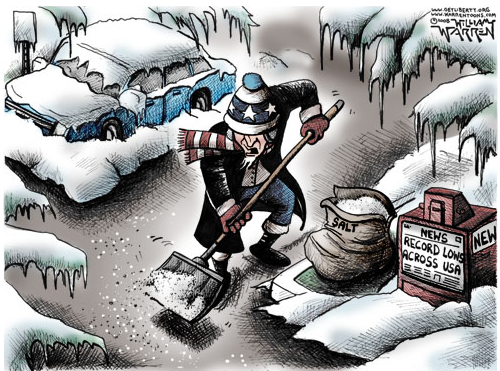The economy only grew at an inflation-adjusted 2.4 percent in 2014 reports the Bureau of Economic Analysis after it downgraded fourth-quarter growth in its most recent report.
Must’ve been that cold weather again.
Readers will recall that was the explanation offered earlier last year for a terrible first quarter in 2014, with headlines such as CNBC’s “Frigid winter takes toll as U.S. GDP contracts for first time in 3 years.”
And we suppose if the first quarter this year is weak, we’ll be told again it was because of all the snow.
In the meantime, 2014 actually marked a 9-year losing streak for the U.S. economy, which has not grown above 3 percent since 2005. Not above 4 percent since 2000.
Didn’t we have winters each of those years? Maybe that was why.
Yet, the slowdown began long before that, where nominal growth — before adjusting for inflation — has been trending downward for more than 30 years.
Was that cold weather too?
But wait, nominal growth was actually rising for much of the postwar period before peaking in the early to mid-1980s.
Was that warm weather? Didn’t those years have winters, too?
Perhaps something else is amiss, for example, shifting demographics and relatively weaker demand as Baby Boomers retire and fewer Americans enter the workforce.
In the postwar era, the Baby Boom generation, as it came of age, contributed to a dramatic expansion of growth, of consumer and corporate credit, rising interest rates and soon inflation.
Now, on the other end of the curve, we see slower growth, weak credit expansion, lower interest rates, and now even deflation.
That’s right. In fact, for the past twelve months, prices across the board have dropped 0.1 percent, according to the Bureau of Labor Statistics. In the past three months, they dropped 0.3 percent, 0.3 percent, and 0.7 percent, respectively, led by sharp decreases in oil and gasoline prices.
But slowing inflation should be good, right? Lower prices generally do benefit consumers. But, household median income has been dropping for a generation, too, reports the U.S. Census Bureau. Relative to incomes, prices are about where they were 40 years ago, but in many cases, like health care, tuition, energy, and housing, prices are higher relative to wages.
Meaning, in the slowing economic environment, even with prices beginning to relax, the American people are still getting poorer.
It’s not just cold weather. If the American people and policymakers are ever going to wrap their heads around what is happening to the economy, they’re going to need more than lame excuses.
Robert Romano is the senior editor of Americans for Limited Government.








